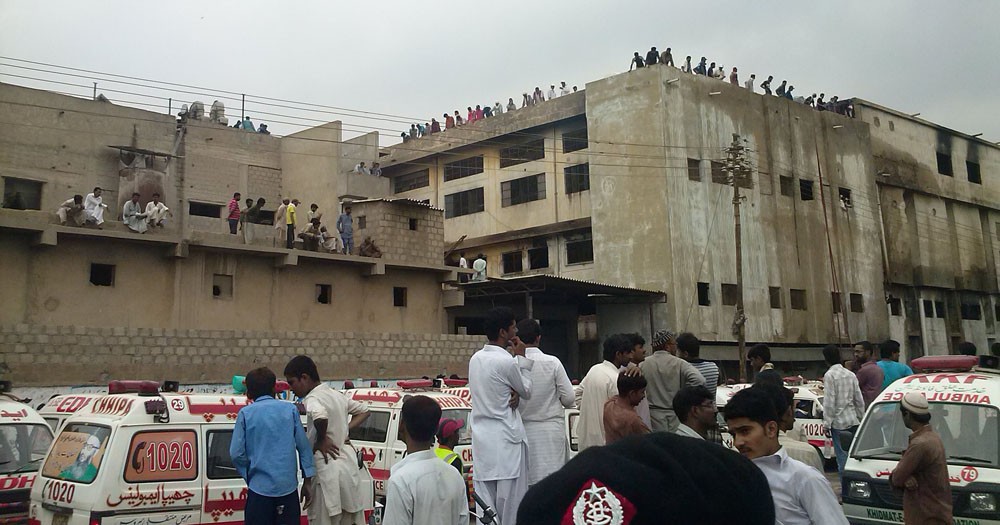
Two years after the deadliest factory fire, criminal case against the owners of Baldia Factory is still undecided and the rights activists are pressing for compensation

Two years ago, on a mid-September morning, fire spiralled out of control and forced factory workers to jump off the windows to save their lives. Ambulance sirens blared. Volunteers collected charred body parts, covering them with white cloth or whisking dead bodies off to morgue. It killed 255 men, women and children.
Two years on, Ali Enterprise in Baldia Town, Karachi, looks like a massive skeleton -- burnt, still emitting a stench of human blood.
Aid workers recall with horror how they had to break open the bolted doors where workers were locked for their shift and how they picked up bodies which had frozen while sitting -- they had suffocated to death.
The owners of the damned Ali Enterprise, Arshad and Shahid Bhaila, went into hiding soon after television screens began flashing news of the worst ever industrial accident in Pakistan. As rights activists filed a petition for murder and criminal negligence in the Sindh High Court, their names were placed on the exit control list and their accounts were frozen. With no option left, they handed themselves over to the police.
After a few months in jail, they were released on bail in February 2013. They had to hand over their passports but their accounts are frozen and the criminal case for attempted murder is pending.
The Pakistan Institute of Labour Education and Research (PILER) that is fighting the case on behalf of the factory fire victims allege the investigation officer involved in the case is favouring the Bhailas.
In a hearing held in the Sindh High Court on September 12 this year PILER appealed the investigation officer be changed. "We are hoping the court will honour our appeal," says Karamat Ali, director PILER.
While the criminal case is still undecided, the rights activists are pursuing the case of victims’ compensation.
In the first phase, each family of the deceased was announced Rs400,000 from the prime minister, Rs300,000 from the chief minister and Rs200,000 from real estate tycoon Malik Riaz. About 176 families received the promised amount while 81 others got Rs700,000 each.
There are families that have still not received death certificates due to delay in results of DNA tests.
As the case proceeded, Rs60 million were obtained from the Bhailas, Rs10 million from KIK Textilien, a German buyer and Rs10 million was collected from philanthropists.
For distribution of funds, the Sindh High Court formed a commission supervised by retired judges. The commission received claims from 255 deceased workers’ families and 55 injured workers’ families. Of that Rs17 million has been distributed as compensation.
A total of 214 victims’ families have received death grant from the government of Sindh but not from the federally-owned Workers Welfare Fund. Some of them are also receiving pension from Sindh Employees Social Security Institution (SESSI) and Employees Old-age Benefits Institution (EOBI).
PILER had filed an application in the Sindh High Court demanding death grants and EOBI pensions to all victims and survivors.
As a result, the Sindh High Court ordered on September 12 that EOBI pension and death grants be provided to all victims’ families immediately.
PILER had an initial meeting with KIK Textilien in Germany in July 2014 where, after initially hesitation, KIK agreed to sit on the negotiation table.
The next meeting between PILER and KIK for the negotiations for the long-term compensation is planned to be held in October 2014 in Berlin, Germany.
If this meeting is not successful and KIK refuses to pay the long-term compensation then PILER will file a case against KIK Textilien in Germany with the help of International advocacy partners in Baldia case in Europe.
A petition is also filed to build a monument and a community centre for the victims’ families at the site of the Baldia factory.
An Italian company RINA had certified that the Ali Enterprise was complying with all international factory safety standards. PILER claims that this certification has been given to several other factories in the city. The Sindh High Court has ordered an investigation into the credentials of this firm. It has also directed the Labour department to begin inspections of all factories especially those that have the RINA certification.
Workers continue to work long shifts in crammed factories getting no breaks between working hours. But rights activists believe that the proceedings of the case in the high court have created pressure both on industrialists and the Sindh government to implement labour laws.
"The Labour department of Sindh has been out of staff for years. Now, after the high court ordered to carry out inspections of factories, they are hiring people," says Karamat Ali. "The hired people will require training which is a long process. The civil society will need to keep pressuring the government to speed up the process."
But, he stress, "the Bhailas’ case will be a reminder for all the other capitalists to treat workers respectfully and take care of their safety".